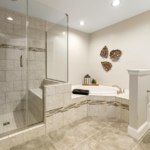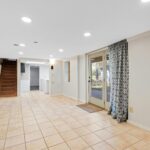Glass can be used for many residential applications, including showers, staircases, doors, and windows. It helps improve a home’s curb appeal, increases natural light, and may lower energy bills. Here are a few tips for choosing custom glass for your home:
Identify Home Needs
A key step for adding custom glass to your home is identifying what your home needs are, including where you plan to install it and the type of glass required. When choosing glass for a shower door, look for tempered and heat-resistant options to prevent cracks and breakage. Shower doors should be able to withstand a wide range of temperatures and fluctuations to remain in optimal condition. Laminated glass is reinforced, offering strength and support suitable for glass shower doors. After selecting a shower door, work with a trusted glazier for proper installation and repair of the glass to prevent accidents.
Staircases may withstand frequent daily use and should have reinforced glass to increase durability. They should also be shatterproof to prevent injuries. When adding custom glass to a balcony, look for transparent options to promote unobstructed views.
Assess Security Needs
Install double-strength custom glass in high-risk areas of your home, like windows and doors, to enhance security. Laminated glass has a double glass layer with a plastic interlayer that holds the glass in place, making it hard to break through. If breakage does occur, laminated and tempered glass typically shatters into round pieces, minimizing injuries.
Analyze Energy Efficiency
Energy-efficient windows are designed to help manage energy bills. They are generally better at retaining heat during cold weather and reflecting it during hot seasons. This benefit may allow you to rely less on your air conditioning system and more on your natural light for warming and cooling. Before purchasing customized glass windows, ask about insulated or low-emissivity glass for enhanced energy efficiency.
Evaluate Noise-dampening Abilities
The Sound Transmission Class (STC) rating measures a material’s ability to block sound. Higher STC ratings indicate better noise reduction. When choosing custom glass for your home, look for products with higher STC ratings, especially if noise reduction is a priority. Thicker glass generally provides better sound insulation than thinner glass. Think about using double or triple-pane glass with varying thicknesses for enhanced noise reduction.
Assess Maintenance Requirements
Custom glass may require maintenance to maintain its appearance and function. When selecting your glass, check whether it is easy to wipe down and resistant to scratching. Consult with your provider on the best cleaning method for each type of glass. This will help avoid cracks, streaks, or haze that can reduce the glass’s appearance. Applying a protective coating or film to the glass may also enhance its durability, reduce maintenance, and protect against scratches or stains.
Install Custom Glass Today
Glass can be customized to maximize your home’s security, function, and appearance. For increased convenience, prioritize working with a professional who can install and repair your glass as needed. Contact an experienced glass company today to learn more about their services and installation process.







